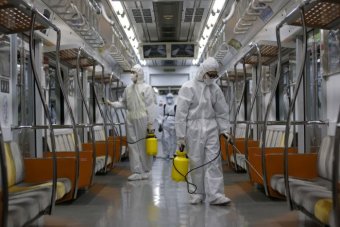South Korea’s health ministry says two more people have died in the country’s outbreak of Middle East Respiratory Syndrome (MERS), bringing the number of fatalities to nine.
Thirteen new infections have also been reported, bringing the total number of cases to 108.
The new cases were all linked to hospitals, the ministry said.
All of those who died had been suffering serious ailments before they tested positive for the MERS virus, the ministry said, including the latest two who were both cancer patients.
South Korea’s infections have all been traced to a man who developed MERS after returning from a trip to the Middle East in early May.
He came into contact with other patients at a hospital before being diagnosed.
The outbreak has caused public alarm, with more than 2,200 schools closing or cancelling classes.
Around the region, some countries have issued advisories against travel to South Korea or stepped up screening of inbound passengers.
The World Health Organisation (WHO), which began work on Tuesday on a joint mission with South Korea to analyse the virus and review the country’s response, has yet to recommend any curbs on travel or trade with South Korea.
South Korea’s new cases bring the total number of MERS cases globally to 1,257 based on WHO data, with at least 448 related deaths.
The country has the second highest number of cases after Saudi Arabia, according to the European Centre for Disease Prevention and Control.
The Australian Department of Health said they are closely monitoring the situation in the Middle East, and other parts of the world, through infectious disease surveillance networks and the WHO.
MERS facts
- Middle East Respiratory Syndrome Coronavirus is known as MERS and MERS-CoV
- All recorded cases can be traced back to the Middle East
- Dromedary camels are thought to be the source of infection
- The virus can be spread person-to-person
- Symptoms include fever, cough, shortness of breath and breathing difficulties
- Severe cases can have a rapid onset of respiratory illness, like pneumonia
- There is no vaccine to prevent the virus
Source: health.gov.au

